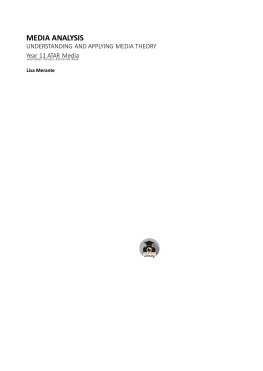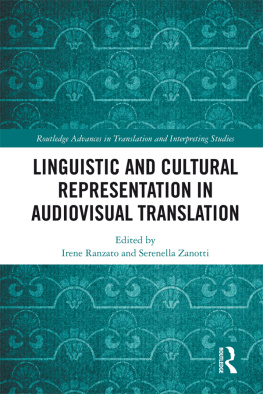
Keywords for Media Studies
Keywords for Media Studies
Edited by Laurie Ouellette and Jonathan Gray

NEW YORK UNIVERSITY PRESS
New York
NEW YORK UNIVERSITY PRESS
New York
www.nyupress.org
2017 by New York University
All rights reserved
References to Internet websites (URLs) were accurate at the time of writing. Neither the author nor New York University Press is responsible for URLs that may have expired or changed since the manuscript was prepared.
ISBN: 978-1-4798-8365-3 (hardback)
ISBN: 978-1-4798-5961-0 (paperback)
For Library of Congress Cataloging-in-Publication data, please contact the Library of Congress.
New York University Press books are printed on acid-free paper, and their binding materials are chosen for strength and durability. We strive to use environmentally responsible suppliers and materials to the greatest extent possible in publishing our books.
Manufactured in the United States of America
10 9 8 7 6 5 4 3 2 1
Also available as an ebook
Contents
Laurie Ouellette and Jonathan Gray
Keywords for Media Studies introduces and advances the field of critical media studies by tracing, defining, and problematizing its established and emergent terminology. Like the authors of other books in the New York University Press Keywords series, we take our bearings from the Welsh scholar Raymond Williams. In Keywords: A Vocabulary of Culture and Society (1976/1983), Williams presented a shared body of words and meanings for understanding general discussions of... the practices and institutions which we group as culture and society (15). Less a dictionary or an encyclopedia than a holistic conceptual map organized around words, his book charted the history and usage of key words as a means of recording, investigating and presenting problems of culture and society to which they were bound (15). Williams did not set out to define a definitive canon of important terms, or to fix their significance for all time. Rather, he charted the dynamic relationship between language, knowledge, and subjects. By tracing the origins and meaning of words across changing social, economic, and political contexts, he opened up space to interrogate and disrupt commonsense assumptions about culture and society in the present. Keywords for Media Studies adapts this approach to the vocabulary of critical media studies. The pages that follow present sixty-five keywords, reflected upon by leading scholars tasked to show how their meanings, histories, and usage intersect with and inform problems and debates in media and society.
Curiously, media receives scant attention in Williamss own Keywords, taking up barely more than a single page. This is likely because Williams, who wrote about television, the press, and radio, understood media less as a singular entity than as an integral and multifaceted aspect of culture and societyas suggested by his two cross-references to longer entries on communication and mediation. It is nonetheless worth considering what he did say about media, a Latin term he traces to the sixteenth century, when it conveyed a sense of intervening or intermediate agency or substance, such as between a sense or thought and its operation (203). In the eighteenth century, the term was adapted to newspapers, to the extent that newspapers were understood (by capitalists) as mediums for advertising. A conscious technical sense of distinctions between print, sound, and vision as media began to emerge during this time as well. According to Williams, the term media was not widely used until the twentieth century, when the plural phrase mass media became common parlance for the new institutions and cultural output of broadcasting, the press, and cinema. Only with this development did the formal study of media (initially called mass communications) emerge, operating with a converged understanding of these three senses of media, says Williams (203).
We can see elements, traces, and rebuttals of these early definitions of media across the entries assembled in this book. For example, while many scholars approach media primarily as forms and sign systems (Williams 1976/1983, 203), newer scholarship on mediated affect has revitalized an understanding of media as acting on and between the physical body and the senses (see Affect, chapter 3). Assumptions about technological specificitythe notion that different media (print, radio, television, the web) have specific properties that take priority over anything actually said or written or shownare still commonplace, even as many scholars reject technological determinism (203). As Williams points out in his entry on mediation, the modern use of media or mass media continues to assign various degrees of power to media institutions to distort the real and impose mediated relations (ideology) on social consciousness (206). The term communication, understood as early as the seventeenth century as to make common to many or to impartan action (72), was initially applied to the development of roads, canals, railways, and other physical facilitiesa focus that lives on in the analysis of space and infrastructure in this volume. Only with the development of other means of passing information and maintaining social contract, he writes, did communication come to refer predominantly to the press, broadcasting, and other mass media (72). In long-standing debates about the power of the mass media, it also is useful to recall the unresolved range of the original noun of action, represented at its extremes by transmit, a one-way process, and share, a common or mutual process, Williams reflected, for the intermediate sensesto make common to many, and impart, can be read in either direction, and the choice of direction is often crucial (7273).
We point to these discursive lineages not to minimize profound changes in media and society since Williams published his Keywords, but to situate the contemporary study of media within a history of ideas manifested in taken-for-granted terms that require more contextualization and unpacking than we usually grant them. Taking cues from Williams, the contributors to Keywords for Media Studies are keen to historicize thinking about media and society, whether that means noting a long history of new media, or tracing how understandings of media power vary across time periods and knowledge formations. We have asked our authors to situate their key terms within the interdisciplinary discipline of media studies, so that this bookin addition to explicating influential wordschronicles a history of ideas about the objects of academic inquiry and the conceptual frameworks in which they have been examined, interrogated, analyzed, and understood. However, even more than Williams, we have urged them to go beyond description and summary, to take stock of media studies now, to intervene in debates, and to chart new arguments. This book introduces those new to the field to some key terms, research traditions, and debates, and their contexts and histories, while also offering both these readers and those who have been teaching and researching in the field for years a sense of new frontiers and questions. Weve often been inspired and encouraged by reading these entries, and hope our readers will similarly use them perhaps to understand the field of play better, yes, but also to see prospects for future work.
What Is Media Studies?
Critical media studies is usually traced to the 1940s, when theorists associated with the Frankfurt School cast their gaze on the burgeoning US mass media and cultural industries. From the 1970s and 1980s, the critical study of media developed at rapid pace, influenced by literary studies, film theory, medium and technology theory, feminist criticism, television studies, and, perhaps most important, British and American cultural studies. These varied (and sometimes contentious) bodies of scholarship differed from the social scientific mass communication tradition that arose in the 1920s in their engagement with qualitative analysis, social, cultural, and political theory, and power relations. In this book, we understand media studies to be focused on this critical tradition, which is (and has always been) broadly interdisciplinary.
Next page






